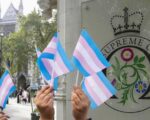>> Belize’s Supreme Court Just Struck Down A Law That Made Homosexuality Illegal.
[spacer]
La plus haute juridiction du Belize, pays d’Amérique centrale d’environ 350 000 personnes, situé au sud du Mexique, côté Caraïbes, et à l’est du Guatemala voisin, a révoqué ce mercredi 10 août une section de son Code criminel qui prévoyait 10 ans d’emprisonnement pour « les relations sexuelles entre personnes du même sexe ».
Une « victoire » pour tous et la fin d’un combat pour l’association LGBT UNIBAM, qui a porté l’affaire en 2010 devant la Cour Suprême et annonce, que dans sa décision, le tribunal aurait en outre statué pour une extension dans la Constitution du droit à la protection contre la discrimination en raison de l’orientation sexuelle.
We won on all counts. Speechless. Omg. Speechless
— UniBAM Belize (@UNIBAMSupport) 10 août 2016
Caleb won his challenge to the Belize anti-sodomy law on all counts and was awarded costs! VICTORY for the Caribbean pic.twitter.com/8Aw39j2phH
— Maurice Tomlinson (@mauricetom2) 10 août 2016
[spacer]
The chief justice of Belize. Kenneth Benjamin have found that section 53 of the criminal code is unconstitutional and must be struck down.
— UniBAM Belize (@UNIBAMSupport) 10 août 2016
[spacer]
Indépendant depuis 1981, le Belize est devenu « la première ancienne colonie de la couronne britannique à dépénaliser l’homosexualité ». Un espoir pour d’autres régions anglophones des Caraïbes, souligne aussi l’avocat Maurice Tomlinson, qui milite en Jamaïque, également constitutive du Commonwealth, contre la loi dite « anti-sodomie », héritée comme souvent de l’ère coloniale.
Il a d’ailleurs intenté une action en décembre 2015 et accuse la Cour Suprême de son pays d’être « à la solde des conservateurs » et soutenir la législation discriminatoire en ralentissant sa procédure. Mais cette décision d’invalider la section 53 du Code pénal qui criminalisait les homosexuels Béliziens, pourrait bien faire jurisprudence devant d’autres tribunaux limitrophes et insuffler de nouvelles surprises.
Terrence Katchadourian
stophomophobie.org
[spacer]
>> The Belize Supreme Court ruled Wednesday that a law punishing homosexuality was unconstitutional. The country is the first former British colony in the Caribbean to strike down its colonial-era sodomy law, and the move could boost LGBT rights throughout the region.
The decision was announced on the LGBT rights group Unibam’s Twitter account soon after the ruling was made. Unibam first brought the challenge against the law back in 2010.
Caleb Orozco, the main plaintiff in the case, told BuzzFeed News in an email that the Supreme Court ruled in his favor on privacy grounds, as well as under protections of « dignity, equality, and freedom of expression. » He added that the court also decided that protections in the Belizean constitution surrounding sex extend to sexual orientation.
Belize, a country of around 350,000 people on the Caribbean coast neighboring Mexico and Guatemala, has had the law in place since its days as a British colony. LGBT advocates are hopeful that the ruling could bolster efforts to eliminate similar laws in 10 other English-speaking countries in the Caribbean that also have roots in their colonial past.
The written judgment in the case was not immediately available.
Another closely watched challenge in the region is Jamaica, where attorney Maurice Tomlinson brought suit against the country’s law criminalizing homosexuality in December. Tomlinson has accused the country’s Supreme Court of « stack[ing] the deck » against his litigation by granting standing to conservative groups supporting the provision.
Tomlinson recently won a partial victory in a separate suit challenging laws in Belize and the country of Trinidad and Tobago that barred gay people from entering the country. The Caribbean Court of Justice, which has jurisdiction over the countries in the Caribbean Community, held that the laws were discriminatory and therefore unenforceable. But the court dismissed the suit as unnecessary because the countries weren’t actually blocking anyone from entry under the provision.
Speaking before the ruling on Belize’s homosexuality law was issued, Tomlinson told BuzzFeed News that a decision to strike down the provision could be « highly persuasive » to courts in other Caribbean nations where similar suits could be filed, and « the reasoning would be very important for my ongoing challenge to the Jamaican anti-sodomy law. »















